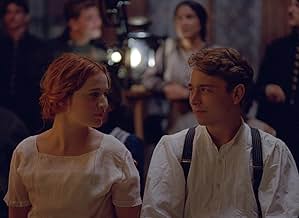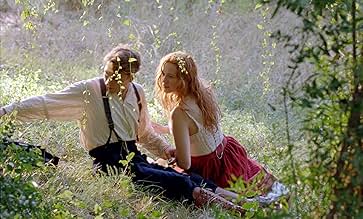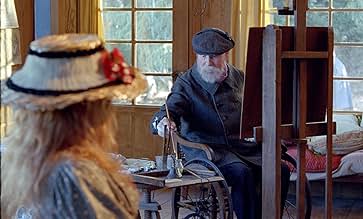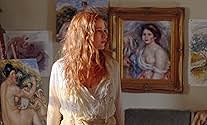अपनी भाषा में प्लॉट जोड़ेंSet on the French Riviera in the summer of 1915, Jean Renoir -- son of the Impressionist painter, Pierre-Auguste -- returns home to convalesce after being wounded in World War I. At his side... सभी पढ़ेंSet on the French Riviera in the summer of 1915, Jean Renoir -- son of the Impressionist painter, Pierre-Auguste -- returns home to convalesce after being wounded in World War I. At his side is Andrée, a young woman who rejuvenates, enchants, and inspires both father and son.Set on the French Riviera in the summer of 1915, Jean Renoir -- son of the Impressionist painter, Pierre-Auguste -- returns home to convalesce after being wounded in World War I. At his side is Andrée, a young woman who rejuvenates, enchants, and inspires both father and son.
- पुरस्कार
- 3 जीत और कुल 11 नामांकन
- La boulangère
- (as Annelise Heimburger)
- Le brocanteur
- (as Thierry Hancisse de la Comédie Française)
- Servante Collettes
- (as Cecile Rittweger)
फ़ीचर्ड समीक्षाएं
Which is not to say that the script and acting are not worth paying attention to. The story is nothing special: During the last years of his life, during World War I, Renoir lived in the South of France, to avoid the German invaders. There he paints a beautiful young woman, whom we get to see in the altogether rather often, to pleasing effect. (The movie never explores the extent to which this has an erotic aspect for Renoir, but since it is made clear that he ended up sleeping with his previous models, we can assume that. He is not just painting rose and pink. He keeps emphasizing that he is painting flesh.) His middle son, Jean (who will be the famous French film director down the road), comes home from the war on sick leave and eventually falls in love with the new model. That doesn't go particularly well, as she doesn't seem very committed to monogamy with him.
The youngest son, Claude (named after Monet), doesn't deal well with his Mother's recent death, or his distant relationship with Renoir. That doesn't get explored very deeply either.
So, in effect, the story threads are handled very Impressionistically as well: little touches of them here and there, but no detailed analysis.
The music is often very beautiful, so don't turn off the sound.
Don't expect great drama here. The acting is all fine, but there are no in-depth character portraits here - as there are not in Renoir's paintings - and no real drama. It is all very impressionistic, and often in a very beautiful way.
See this in a theater if you can. I suspect it will lose a lot reduced to even a 64" TV screen.
------------------------------
I just saw it for a second time, this time on my 46" TV screen. Yes, it does lose a lot, but the color and light are still beautiful. It's a must see movie, but as I wrote before, don't expect much in the way of drama.
Gille +Bourdos uses the well-known stories of the painter father Pierre-Auguste and the filmmaker son Jean Renoir for a film that is at once breathtaking spectacle and a profound anatomy of the impulses and values of art. The film was one of my highlights at this year's +Palm Springs International Film Festival.
The plot presents the 74-year-old veteran painter (Michel Bouquet) and his ravishing new 15-year-old model, Andree Heuschling (Christa Theret) enjoying their opulent country estate while WW I pounds the humanity outside. Mark Lee Ping-Bin shoots the interiors with classic Dutch light and shadow but the exteriors in the unbridled luminosity of Impressionism. Here Renoir explains that structure comes from colour, not form, and he refuses to use black. That summarizes the painter's Impressionism: it finds reality in what he makes of the outside world, not what it firmly may be. His swirls of rosy chub continues his celebration of the young "velvet" flesh, despite the war's flensing and destruction of the flesh beyond the estate and his age's grotesque gnarl and ruin of his bones. His painting days, like his valiant denial of death, are limited.
Son Jean (Vincent Rottiers) returns from the front with a symbol of the reality his father rejects: an open wound. The family has a variety of open wounds, from the loss of the boys' mother and the favoured model/nanny Gabrielle to the sons' resentment of their father's aloofness. The cut to the bone represents the reality Renoir's fleshy ladies and painted pommes reject. Vincent's convalescence goes beyond the flesh gap to include winning Andree, who -- a closing title tells us -- married him, starred in many films (as Catherine Hessling), and after their split died alone in poverty. The sins of the father don't just visit the son but move in with him.
The tension between the painter's idealized flesh and the its horrific reality are frequently imaged, especially in the eating scenes and in the kitchen where a maid delicately peels a tomato, removing a hide to expose a succulent flesh. The hanging carrion are an implicit reminder of the hunting and killing of the human prey outside. Renoir pere screams from the nightmares he doesn't have his sunshine, models and pink paints to ward off.
Around the story of Renoir pere beats a more subtle story of Renoir fils. Like Andree, the film serves both father and son. Unobtrusively Bourdos weaves in the specific sources of Renoir's cinema. These include his sense that wars shatter natural cross-border fraternities, the harshness of the class prejudices, the increasing disrespect for culture, the necessity for art. Even the quintessential understanding which will become "The terrible thing is, everyone has his reasons." For more see www.yacowar.blogspot.
क्या आपको पता है
- ट्रिवियाOfficial submission of France to the Oscars 2014 best foreign language film category.
- गूफ़When Pierre-Auguste walks in on Jean Renoir being bathed, a modern toggle-style light switch is visible on the wall. The toggle switch wasn't invented until 1917, which is a few years after that part of the film. Earlier light switches were push-button style, and the switch on the wall is also of a modern plastic style that is very much later.
- भाव
Pierre-Auguste Renoir: You're rather modest for an actress.
Andrée Heuschling: Actress doesn't mean whore.
- कनेक्शनFeatured in Fandor: Cannes You Dig It? | Fandor Spotlight (2022)
- साउंडट्रैकShimmy Dédée
By Patrick Artero
Performed by Patrick Artero, Philippe Baudouin, Francis Guero, André Neufert and Michel Queraud
टॉप पसंद
- How long is Renoir?Alexa द्वारा संचालित
विवरण
बॉक्स ऑफ़िस
- US और कनाडा में सकल
- $22,93,798
- US और कनाडा में पहले सप्ताह में कुल कमाई
- $65,194
- 31 मार्च 2013
- दुनिया भर में सकल
- $78,16,573
- चलने की अवधि
- 1 घं 51 मि(111 min)
- रंग
- ध्वनि मिश्रण
- पक्ष अनुपात
- 1.85 : 1
































